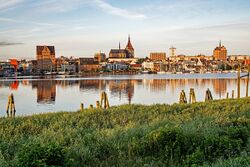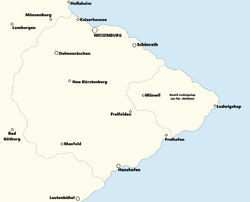Weisenburg: Difference between revisions
mNo edit summary |
No edit summary |
||
| (One intermediate revision by the same user not shown) | |||
| Line 14: | Line 14: | ||
}} | }} | ||
'''{{PAGENAME}}''', officially the '''Free Imperial City of Weisenburg''' ([[wikipedia:German language|Saxon]]: Freie Reichsstadt Weisenburg) is the capital and largest city in the [[United Principalities of Cibola]]. | '''{{PAGENAME}}''', officially the '''Free Imperial City of Weisenburg''' ([[wikipedia:German language|Saxon]]: Freie Reichsstadt Weisenburg) or known simply as ''Die Hauptstadt'' (The Capital) is the capital and largest city in the [[United Principalities of Cibola]]. | ||
Formerly known as [[Nieuw Rotterdam]], the city was renamed to Weisenburg in honor of it's refounding by [[Ludwig von Heida-Weisse]] in {{AN|1725}}. | Formerly known as [[Nieuw Rotterdam]], the city was renamed to Weisenburg in honor of it's refounding by [[Ludwig von Heida-Weisse]] in {{AN|1725}}. | ||
==History== | ==History== | ||
The | The area around modern-day Weisenburg was first settled by Germanians in the early {{AN|1500}}s by the [[Germania]]ns. The area was later conquered by the [[Monovia]]ns, who then colonized the area and founded the village of ''Roeterville'' in {{AN|06|2006}}. The village was then abandoned when Monovia collapsed in {{AN|04|2007}}, but was then refounded the following year by [[Zandarijn]], a dominion of [[Craitland]]. Although relegated as a city of secondary importance compared to cities such as [[Hamstadt]] and [[Oudorp]], it remained a regional center of culture, trade, and finance. | ||
Upon the collapse of Zandarijn, the city languished in the lawlessness of [[The Green]] for several years. The population of the city were subject to several [[ESB-Kosaken Afzælt|Cossack]] raids and the city was severely looted. It was feared that the city would be annexed into the [[Natopia]]n [[Principality of Whales]], as the ''[[1706 Decree in Whales on the Plantation of Nieuw Rotterdam]]'' laid the sufficient groundwork for a trade and plantation settlement to be founded in the area by the [[Honourable Company]]. This fear would remain until a [[Second Ludwiggian-Monovian War#Battle of Nieuw Rotterdam|fierce battle]] was fought, and such plans were abandoned. The former plantation was destroyed, and some of its remains were made into a museum. The cities old Zandt population gradually became overshadowed by Saxon-speaking migrants looking for work and refuge from [[Razzia]]s. | Upon the collapse of Zandarijn, the city languished in the lawlessness of [[The Green]] for several years. The population of the city were subject to several [[ESB-Kosaken Afzælt|Cossack]] raids and the city was severely looted. It was feared that the city would be annexed into the [[Natopia]]n [[Principality of Whales]], as the ''[[1706 Decree in Whales on the Plantation of Nieuw Rotterdam]]'' laid the sufficient groundwork for a trade and plantation settlement to be founded in the area by the [[Honourable Company]]. This fear would remain until a [[Second Ludwiggian-Monovian War#Battle of Nieuw Rotterdam|fierce battle]] was fought, and such plans were abandoned. The former plantation was destroyed, and some of its remains were made into a museum. The cities old Zandt population gradually became overshadowed by Saxon-speaking migrants looking for work and refuge from [[Razzia]]s. | ||
Latest revision as of 15:07, 4 September 2024
| Nation: | |
| Population: | 290,000 (est.) |
| Predominant language: | Saxon |
|
| |
| Main roads: | Autostraße 1 |
| Major districts: | |
|
| |
| Current mayor: | Erich Heidermann (KNU) |

| |
| Map versions: | |
Weisenburg, officially the Free Imperial City of Weisenburg (Saxon: Freie Reichsstadt Weisenburg) or known simply as Die Hauptstadt (The Capital) is the capital and largest city in the United Principalities of Cibola.
Formerly known as Nieuw Rotterdam, the city was renamed to Weisenburg in honor of it's refounding by Ludwig von Heida-Weisse in 1725 AN.
History
The area around modern-day Weisenburg was first settled by Germanians in the early 1500 ANs by the Germanians. The area was later conquered by the Monovians, who then colonized the area and founded the village of Roeterville in 1517 AN. The village was then abandoned when Monovia collapsed in 1527 AN, but was then refounded the following year by Zandarijn, a dominion of Craitland. Although relegated as a city of secondary importance compared to cities such as Hamstadt and Oudorp, it remained a regional center of culture, trade, and finance.
Upon the collapse of Zandarijn, the city languished in the lawlessness of The Green for several years. The population of the city were subject to several Cossack raids and the city was severely looted. It was feared that the city would be annexed into the Natopian Principality of Whales, as the 1706 Decree in Whales on the Plantation of Nieuw Rotterdam laid the sufficient groundwork for a trade and plantation settlement to be founded in the area by the Honourable Company. This fear would remain until a fierce battle was fought, and such plans were abandoned. The former plantation was destroyed, and some of its remains were made into a museum. The cities old Zandt population gradually became overshadowed by Saxon-speaking migrants looking for work and refuge from Razzias.
In 1720 AN, the Saxon noble Ludwig von Heida-Weisse led a military expedition into the city. As his old hereditary estate (the Kürstenberg Manor near Vulcuria) had been destroyed during the final collapse of the Lanzerwald, he proclaimed Nieuw Rotterdam his new seat of power. He would later rename the city "Weisenburg". He declared the city to be a Festung (fortress), and that "no foreign army nor barbarians shall ever do harm to this city again."
The city became the location of which the Proclamation of Weisenburg was signed, establishing the United Principalities of Cibola. Over the following years the city would continue to grow, and became a Free Imperial City in its own right in 1727 AN. Since then the city had been continued to grow with many suburbs such as Schönrath, Kaiserhausen, and Delmenräschen springing up and growing in population.
Governance
The city is governed as its own distinct entity within the United Principalities. It is governed by a Lord-Mayor (Oberbürgermeister) who is elected by the city's population and confirmed by the Emperor and the Imperial Senate. The Öberburgermiester then appoints the City Council (the Stadtrat). Both the Öberburgermiester and the Stadtrat are based in the Neuesrathaus in the Mitte District. The Altesrathaus, also in the Mitte district, was bought from the city by Ludwig I and given to the Imperial Senate.
To the east of the city lays the Bezirk Ludwigskap, an exclave of the Principality of Alch. This arrangement came out due to the former Duke of Alch, Friedrich von Hutten, having purchased land around the town of Ludwigskap. During the negotiations surrounding the Proclamation of Weisenburg, Friedrich's son Alfred was allowed to integrate the Ludwigskap and the nearby village of Münwil into the Principality of Alch. This has led to the area becoming an idealistic holiday spot, with it escaping the increasing urbanization of the Capital District.
Subdivisions
The city is subdivided into 5 districts (Bezirke). Each district has several traditional subdistricts or neighborhoods (Ortsteile), which are not officially used but are held in high regard by city residents.
The 5 districts are:
- Mitte
- Königsstadt
- Altrotterdam
- Werften
- Reichendorf
